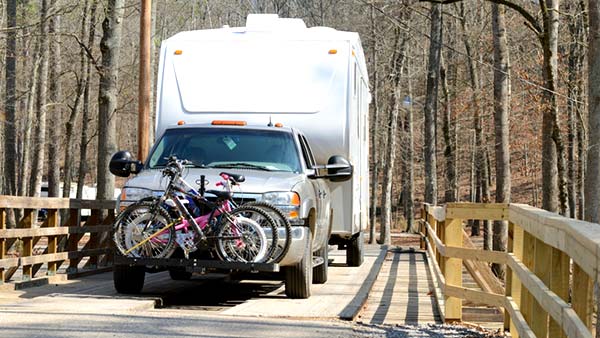
Ensure a safe and fun trip with your trailer or boat by following some towing tips.
Every year millions of motorists by choice or necessity tow a trailer behind their car or pickup truck.
Although towing a utility trailer, boat, travel trailer or other equipment isn’t “rocket science,” you should realize there’s more involved than when you’re driving a vehicle with nothing hooked behind. Here are some trailer-towing safety tips:
Before You Go
Before you hook up the trailer, inspect the trailer, hitch and safety chains for excessive wear. Ensure the electrical hookups work for the trailer wiring and brakes. Check tire air, oil, fuel and coolant levels — you should do this before any trip, whether or not you’re towing a trailer. Make certain the vehicle and trailer lights operate.
Proper Trailer Loading
Load the trailer with heavier items toward the front for proper weight distribution. About 60 percent of the cargo weight should be in the trailer’s front half. This properly places about 10 percent of the loaded trailer weight on the tow-vehicle hitch.
Practice Driving…Especially Backing
If you’re not a trailer-towing rock star, take time to practice before beginning your trip. When backing up, place one hand on your vehicle’s steering wheel at the six o’clock position. To move the trailer’s rear end to the right, turn the steering wheel to the right; to the left, turn left. In more complex towing situations, such as boat launching, use low-range gears for extra power and control.
Turning Suggestions
Allow more room to the inside on right turns since the trailer wheels track to the inside turn path more than will the vehicle wheels.
Passing
When passing a slower motorist or changing lanes, signal well in advance and move gradually into the next lane. After passing, allow the trailer or RV extra room before returning to the driving lane. Avoid passing on steep grades, up or down.
Stopping
Driving while towing a trailer requires a greater distance to stop. A good rule of thumb: allow one vehicle and trailer length between you and the vehicle you’re following for each 10 mph of speed. Eliminate panic stops by shifting to a lower gear and pumping brakes lightly to reduce vehicle speed.
Clearance
Be aware of the height of the trailer you’re towing. It may be taller than the vehicle you’re accustomed to driving. Pay attention to posted height restrictions, especially on side roads, city streets and parking lots. You wouldn’t want to exit the drive-through with more than just your meal. Better to park and walk inside.
Parking
When parking your vehicle and trailer combination, place a foot on the brake and have someone outside your vehicle help you. Your assistant should place blocks behind the tow vehicle wheels on an upward grade, or in front of the wheels on a downward grade. It is also recommended that you set your vehicle emergency brake.
Loading Hints
First and foremost, no passenger – either human or animal – should ever ride in the trailer! That said, here are a few other tips:
- Keep your most frequently used personal items in the vehicle, not the trailer, for convenience.
- Be sure all items stowed in the trailer are tied down or secured before heading down the highway. Have you ever seen a cooler on the interstate median?
- Distribute passengers equally over the available seating space to promote better vehicle riding and handling characteristics.
- Make sure both the trailer and your towing vehicle are within load recommendations. Hauling too much can result in handling and trailer stability problems.
- Observe all posted speed limits; especially in bad weather or slippery road conditions, it’s always wise to slow down.
Know Your Limitations
A number of professional trailer towing companies will haul your travel trailer, boat, horse trailer, etc. to your final destination quickly and safely. Be certain to work with only reputable carriers with proper licensure and insurance; request references and reviews.
Finally, here’s another useful tip: actually read your vehicle’s owner manual for other helpful towing information. Follow all state and local laws where you plan to tow; learn the rules by consulting the department of transportation website for the states you plan to visit. For more information and helpful tips, review the National Highway Traffic Safety Administration booklet on “Towing A Trailer”.
Please consult with your local, independent insurance agent to make sure your auto policy is road-ready for towing. This loss control information is advisory only. The author assumes no responsibility for management or control of loss control activities. Not all exposures are identified in this article.
